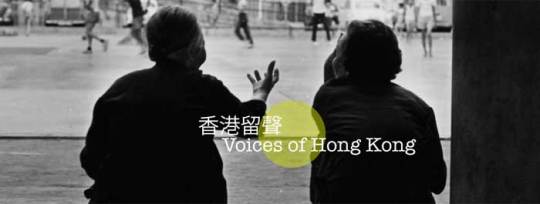
Background
Interview methodology
Organization of the Archives
Background
“Hong Kong Voices”, an important component of Hong Kong Memory, is a digital oral history archive which collects the life experiences, perceptions and sentiments of Hong Kong individuals by means of oral history methods. It is a dynamic and proactive way to preserve the cultural history of Hong Kong.
Between 2008 and 2013, Hong Kong Memory completed about 120 audio/audio-visually recorded interviews. Interviewees come from different age groups, places of origin, ethnic backgrounds, social classes and occupations. The scope of the interviews covers a wide range of subjects such as industry, education, community, housing, art and culture, and social life in Hong Kong under the Japanese occupation. The length of the interviews ranges from 1 to 10 hours. Cantonese is used in most of them. In their search for potential interviewees, Hong Kong Memory contacted many organizations, including companies, trade associations, community and welfare organizations as well as individual scholars. Many interviewees were identified and contacted through these referral agents. Hong Kong Memory also made direct calls to potential interviewees.
Interview methodology
The oral history approach of “Hong Kong Memory” emphasizes both the life history of the individual interviewee and major themes in Hong Kong history. In terms of the former, many interviewees have vivid memories about their childhood, family, native place, migration, education, work and career, marriage, residence, social intercourse and community participation. Besides, Hong Kong Memory asked questions specifically related to the background and experience of each individual. For example, when speaking with industrialists, the focus was on the development of the company and the specific trade; in the case of teachers, on the other hand, the focus was on schooling experiences, and changes in mode of learning and classroom culture. In order that relevant questions were asked, a large amount of background research had to be done beforehand. The interviewer needed to prepare well in order to engage the interviewee intelligently and insightfully. The flow of conversation was not pre-set; rather, the tone and content of the conversation emerged naturally as a result of the interaction between the interviewer and interviewee.
Organization of the Archives
The Archives are composed of oral history records and valuable items donated by interviewees which include old photographs, artifacts and documents. All these materials were digitized for the Archives. In addition, Hong Kong Memory collected other relevant materials that facilitated and empowered the oral history work.
(1) Profile
Each oral history record forms an independent profile. Each profile consists of five sections:
- Brief Biography – a biographical summary of the interviewee, with the basic information such as birth date, birth place, ethnic origin, family, education, occupation
- Highlights of interview – clips are made of special parts of the interview, each being 1 to 3 minutes long; together these clips provide a snapshot of the interviewee’s life account
- Full record – this includes the entire processed audio/audio-visual record of the interview
- Gallery – photographs and documents supplied by the interviewee and/or collected by Hong Kong Memory
- Reference – background research materials that facilitate the understanding of the interview content.
(2) Meta-data
Meta-data is created to describe the background of each material item. Meta-data of the interviewees provides their biographic information, setting of the interview, details of the audio/audio-visual record and the materials donated by the interviewees. Meta-data of each audio/audio-visual record gives a summary of the content and indexes by keywords, themes and subjects. Meta-data of photographs and documents provide indexes by keyword and source of the materials. The textual information in the meta-data enables users to find relevant oral history records by keyword search.
(3) Featured Stories
The archives will feature interesting stories. The stories, extracted from the rich and varied contents of separate interviews, are told through text narratives and selected audio clips and photographs. These stories are memories of individual interviewees which, collectively, reflect different aspects of Hong Kong’s past. They allow readers to contemplate the meaning of a community’s collective memory and the relationship between the living history of nameless individuals and the Grand Historical Narrative.

